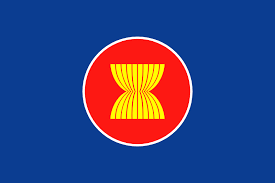
The foto has taken from Wikipedia
STRATEGIC ASSESSMENT. Joko Widodo, President of the Republic of Indonesia, it is not an exaggeration to say that Southeast Asia is one of the few stable and peaceful regions on the planet. With stability and peace, Southeast Asia’s economic growth is almost always higher than global economic growth. This situation would not be possible if ASEAN did not exist.
It is ASEAN that makes a major contribution to a peaceful, stable, and prosperous Southeast Asia. However, ASEAN must not be careless. Major powers are increasingly pursuing tug-of-war of interests in this region and Indo-Pacific. Given the current situation, it is almost certain that ASEAN will face more difficult challenges in the future. As a result, what contribution will Indonesia make during its ASEAN chairmanship?
There are four great spirits of Indonesia’s ASEAN leadership: First, ASEAN’s long-term vision must be established. ASEAN is currently negotiating the ASEAN Concord IV. If the negotiations are successful, ASEAN will have a solid foundation from which to continue its journey and face challenges until 2045. Second, ASEAN should become more resilient in the face of future challenges. Third, make Southeast Asia the growth center or epicenter. The fourth spirit is putting the ASEAN Outlook on the Indo-Pacific (AOIP) concept into action.

Southeast Asian leaders led by Indonesian host President Jokowi are gathering in their final summit this year, besieged by divisive issues with no solutions in sight: Myanmar’s deadly civil strife, new flare-ups in the disputed South China Sea, and the longstanding U.S.-China rivalry.
The absence of U.S. President Joe Biden, who typically attends, adds to the already somber backdrop of the 10-state bloc’s traditional show of unity and group handshakes. Marty Natalegawa, a respected former foreign minister of Indonesia, expressed disappointment over Biden’s non-appearance, but said such red flags were more alarmingly emblematic of ASEAN’s declining relevance.
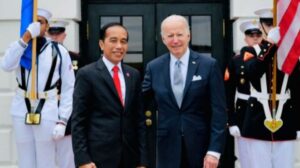
Vice President Kamala Harris will also be attending the East Asia Summit, which will bring together ASEAN and a disparate group of partners: the United States, China, Russia, Australia, India, Japan, New Zealand, and South Korea. ASEAN as a group adheres to the principles of nonalignment, consensus-based decision-making and noninterference in the domestic affairs of other countries.
Those principles contribute to the group’s ambiguity and ineffectiveness in addressing geopolitical issues that are the key focus of next week’s meetings, including: South China Sea disputes, violence in Myanmar, war on Ukraine, and U.S. President Joe Biden’s absence at the ASEAN Summit 2023.
Calling on the regional bloc to find a peaceful and lasting solution to the issue, Indonesia’s Foreign Minister Retno Marsudi at the ASEAN Foreign Ministers’ Meeting (AMM) said the insignificant progress in implementing ASEAN’s five-point consensus on Myanmar has not only “left a negative mark” on the grouping, but has also overshadowed its progress in other efforts. Indonesia.” “As the summit host, has worked hard to push for a united ASEAN solution, Retno said, but noted that “ASEAN can only steam forward in full power if we can ensure a peaceful and lasting solution in Myanmar”.
Indonesia’s initiative to accelerate the process of negotiating a code of conduct (CoC) in the South China Sea was successfully agreed upon by all ASEAN countries and China, Foreign Affairs Ministry Director Rolliansyah Soemirat said on Friday. Indonesia’s initiative in the form of guidelines can serve as practical guidelines that also contains substantive material to keep the CoC effective and actionable, Rolliansyah said.
The guidelines, the first in history, summarize ASEAN and China’s aspirations to complete the CoC in three years or less, through intensive discussion of pending issues and other proposed working methods to make negotiations faster and more effective.
Karishma Vaswani, Bloomberg Opinion columnist covering Asia politics with a special focus on China said Delhi, Hanoi, but not Jakarta. U.S. President Joe Biden is skipping the ASEAN meeting this week and sending Vice President Kamala Harris instead. The optics aren’t great, especially as Biden is going to be in the region: He’s traveling to Delhi for the G20 summit and Hanoi right after. Not only is Biden not attending, he is snubbing a major regional power — and given that the United States has consistently said it wants to build a stronger relationship with Asia, it feels a little like an own goal. …. Skipping it makes the United States look like it just wants a marriage of convenience with Asia, rather than a partnership of any real substance.
Maritime Affairs and Investment Coordinating Minister Luhut B. Pandjaitan met with Chinese Prime Minister Li Qiang on the sidelines of Indonesia-China Business Community Reception at the Shangri-La Hotel, Jakarta. The two discussed downstreaming, digitalization, infrastructure development, education, economic distribution, and decarbonization. Luhut said that the cooperation that had been carried out would provide real evidence for the world, not just for the two countries. He added that the close cooperative relations between the two cannot be separated from mutual trust, mutual benefit and mutual respect in accordance with Eastern traditions.
President Jokowi during the opening session of the 43rd ASEAN Summit in Jakarta on Tuesday affirmed that no parties should make the Association of Southeast Asian Nations (ASEAN) an arena of destructive rivalries.
“We should place the ASEAN ‘boat’ as a place to foster cooperation in the hopes of realizing prosperity, stability, and peace, not only for the region but also for the world as a whole,” the president said. He underscored that ASEAN leaders had agreed to not let any parties take advantage of the Southeast Asian region as their proxy field for their struggles for power and influence.
Southeast Asian leaders have agreed to set up a “troika mechanism” comprising the immediate past, current, and incoming chairs of their regional grouping to tackle the crisis in Myanmar, with the Philippines set to replace the junta-run country at the helm in 2026. Foreign Affairs Minister Retno Marsudi said the leaders reiterated the need to stop the violence in Myanmar while agreeing to establish a troika mechanism that would allow the immediate past, current and incoming ASEAN chairs to manage the crisis together and in a continuous manner.
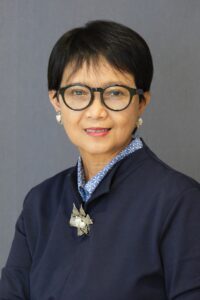
Retno added that ASEAN leaders have also reviewed the implementation of the Five-Point Consensus put in place since April 2021, and decided that it should remain the main reference to address the ongoing political crisis in Myanmar.
Southeast Asian leaders decided that Myanmar won’t take over the rotating leadership of their regional bloc as scheduled in 2026, Asian diplomats and a leader said in the latest blow to efforts by its ruling generals to gain international recognition after violently seizing power in 2021.
The Philippines agreed to take over the regional bloc’s chairmanship in 2026 at an ASEAN summit hosted by Indonesia, Philippine President Ferdinand Marcos Jr. said in a statement, citing what he told fellow leaders in the closed-door meetings.
At the ASEAN Indo-Pacific Forum (AIPF), President Jokowi announced an agreement between ASEAN members and other partners worth $38.2 billion, which includes 93 projects and 73 potential projects worth $17.8 billion. ASEAN countries will develop several sectors in this jumbo agreement, including the digital economy and renewable energy development.
Indonesia, who chairs the ASEAN Summit this time, also worked to optimize opportunities for cooperation. President Jokowi said that these concrete outcomes demonstrated the 43rd ASEAN Summit’s high synergy for common interests. According to Jokowi, the cooperation reflects a commitment to establishing a peaceful, stable, and prosperous Indo-Pacific, with significant benefits for the people of the region and the world.
Indonesia continues to promote economic cooperation in the Indo-Pacific to resolve challenges stemming from geopolitical rivalries and potential conflicts in the region, Indonesian President Jokowi said at the opening session of the ASEAN Indo-Pacific Forum (AIPF). ASEAN’s economy, which is expected to grow stronger through the development of the downstream industry and an electric vehicle (EV) ecosystem, is a concrete example of efforts to build a regional supply chain, President Jokowi said.
ASEAN needs $29.4 trillion (IDR 441 quadrillion) for the energy transition as well as innovative financing schemes through mutually beneficial and sustainable partnerships, he noted.
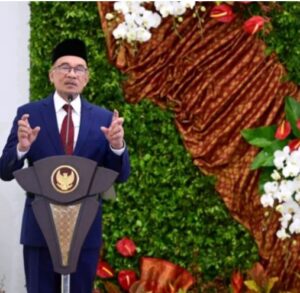
Malaysian Prime Minister Anwar Ibrahim mentioned the new map released by China in his speech at the ASEAN Summit, while also emphasizing Kuala Lumpur’s position on the issue. Anwar believes that problems in the South China Sea must be resolved peacefully and rationally through dialogue. He also saw the need for consultations in accordance with universally recognized principles of international law, such as the 1982 United Nations Convention on the Law of the Sea (UNCLOS). Previously, China released 2023 edition of the standard map of China, which features its U-shaped line, last week. The map shows China covering roughly 90 percent of the South China Sea.
Indonesia decided to strengthen trade cooperation and increase transaction for a number of commodities with Myanmar despite Myanmar under internal conflicts. The Indonesian Chamber of Commerce and Industry (Kadin) met with the Union of Myanmar Federation of Chambers of Commerce and Industry (UMFCCI) at the ASEAN-Business Advisory Council (BAC) Business Roundtable on Myanmar.
Alternate Chair of ASEAN-BAC Bernardino Vega said the meeting discussed how to increase trade and investment flows between the two countries, especially in 4 fields: agriculture, garments, consumer products, and energy.
President Jokowi during the 11th ASEAN-U.S. Summit in Jakarta was called on the United States to become a positive force in ensuring that the Indo-Pacific remains a stable, peaceful, and prosperous region through concrete and inclusive cooperation. He highlighted that Southeast Asia is projected to become an international trade hub by 2045 and contribute 5.4 percent to the global gross domestic product (GDP). Therefore, a solid and sustainable partnership will benefit not only ASEAN, but also the United States.
U.S. Vice President Kamala Harris in a bilateral meeting with President Jokowi on the sidelines of the ASEAN Summit expressed hope that the business partnership between the United States and Indonesia can improve going forward. She said the United States would also continue to work with Indonesia to build a resilient supply chain. On security issues, Kamala said the United States is proud to expand its defense partnership to support Indonesia’s maritime security agencies and support international air boundary regulations.
At limited free trade agreement (FTA) proposed by Indonesia that will allow nickel and other critical commodities used in electric vehicle (EV) production to benefit from U.S. tax credits was a focus of talks between Vice President Kamala Harris and Indonesian President Jokowi in Jakarta, Indonesia. “Moving forward, we also look forward to working with you to increase the flow of goods and services between our nations, including through the Indo Pacific Economic Framework,” said Harris during her meeting with Jokowi.
In a bilateral meeting with President Jokowi on the sidelines of the ASEAN Summit at the Jakarta Convention Center, U.S. Vice President Kamala Harris described Indonesia as an important partner and friend. During the meeting, the United States and Indonesia agreed to continue to strengthen cooperation in the energy transition and the digital economy of Indonesia. The friendship and relations between the two promote both countries’ prosperity and security, as well as a free and open Indo-Pacific. Harris also praised Jokowi’s economic growth priorities, as the same thing is a top priority in the United States. As a result, the United States launched the Just Energy Transition Partnership, a $20 billion infrastructure initiative, last year.
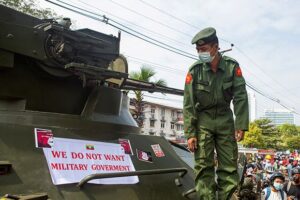
Myanmar’s junta was criticized an ASEAN statement condemning military violence and the targeting of civilians as “one-sided,” a day after it said it would not take up its upcoming chairmanship of the bloc. Myanmar slammed the review as “not objective” and “one-sided,” in a statement published on Wednesday in the state-backed Global New Light of Myanmar. It called on ASEAN to “strictly adhere to the provisions and fundamental principles of the ASEAN Charter, especially non-interference in the internal affairs of the member states.”
Foreign Affairs Minister Retno Marsudi revealed that U.S. Vice President Kamala Harris supported ASEAN’s role in maintaining peace in the Southeast Asian region on Wednesday. “Vice President Harris expressed her commitment to support ASEAN centrality in maintaining peace and stability,” said Minister Retno. In addition, Retno said the United States praised Indonesia’s role in the issue of the Myanmar conflict. “The United States also appreciates Indonesia’s leadership in handling the Myanmar issue and re-emphasizes support for the Five-Point Consensus,” said Retno.

President Jokowi expressed his view that relations between ASEAN countries and China could generate real cooperation if they rely on mutual trust in each other. “This concrete trust and cooperation can be a positive force for regional stability and peace,” he said while opening the 23rd ASEAN-China Summit in Jakarta on Wednesday.
Jokowi did not directly mention the South China Sea or China’s new map. According to Jokowi, China has been ASEAN’s dialogue partner since 1996. In 2021, ASEAN and China elevated their ties to a comprehensive strategic partnership. The president emphasized that this relationship should be interpreted by realizing concrete cooperation that is mutually beneficial.
China and Indonesia discussed potentially extending a multi-billion dollar Beijing-funded railway project, an Indonesian minister said, after Chinese Premier Li Qiang rode the bullet train on a trial run. The prospect of extending it to Indonesia’s second-biggest city of Surabaya, more than 700 kilometres across the island of Java, was discussed with Li and the premier was supportive, senior Indonesian minister Luhut Pandjaitan told reporters.

Chinese Prime Minister Li Qiang said that Chinese President Xi Jinping has committed to spending $150 billion to import agricultural products from ASEAN countries in commemoration of the 30th anniversary of the China-ASEAN economic dialogue in 2021. According to Li Qiang, China has spent more than $55 billion (IDR841.5 trillion) in just two years to import agricultural products from ASEAN member countries. He said trade between China and ASEAN reached $970 billion (IDR 14,841 trillion) in 2022 alone.
President Jokowi was handed over the gavel that marks the group’s chairmanship to Laotian Prime Minister Sonexay Siphandone as Jakarta wrapped up the 43rd ASEAN Summit. The summit adopted 90 documents and agreements with key partners, including the United States, Australia, China, and Russia.
Among the documents agreed upon by the member countries was the alliance’s strengthening mechanism through Concord IV, which would serve as the ASEAN Joint Vision 2045. The leaders also agreed on a five-point consensus review to resolve the Myanmar crisis. President Jokowi handed over the chairmanship to Laos.
Southeast Asian leaders ended their annual summit with their eyes on over $38 billion worth of deals but the three days of intense talks failed to yield solutions to critical issues, including tensions in the South China Sea and conflict in Myanmar. Festering South China Sea tensions loomed over the summit.
China has overlapping claims with several Southeast Asian countries in the waters, a key trade route rich in marine life. Indonesia noted in a statement that “concerns were expressed by some ASEAN member states on the land reclamations, activities, serious incidents in the area.”
The territorial issue has been simmering for years, and ASEAN leaders have tried to compile a code of conduct with China aimed at avoiding conflict. But Indonesia’s statement on the issue was vague, mentioning only that the bloc looked forward to an early conclusion of an effective and substantive agreement in accordance with international law.
In a joint statement by leaders at the 43rd ASEAN Summit in Jakarta, ASEAN leaders agreed to maintain and encourage a conducive environment for code of conduct (CoC) negotiations in the South China Sea, one of which is to uphold the 1982 U.N. Convention on the Law of the Sea (UNCLOS). The leaders underscored the importance of full and effective implementation of the Declaration of Conduct of the Parties (DoC) in its entirety, also welcoming the progress achieved in South China Sea CoC negotiations. In a joint statement, ASEAN leaders underscored the importance of strengthening maritime cooperation and the need to explore new initiatives to achieve that goal.
President Jokowi reminded the United States that any disturbances that occurred in Southeast Asia could disrupt the global economy and security, Foreign Affairs Minister Retno Marsudi said after accompanying Jokowi at the 11th ASEAN-US Summit in Jakarta. “The president also said that regional stability is a common interest,” Marsudi told reporters. During the summit, the president also said the ASEAN-US partnership would not only benefit ASEAN but also the United States.
A senior Indonesian diplomat, who declined to be identified, said that ASEAN had denied Myanmar the opportunity to become chairman for the next few years. Nonetheless, ASEAN will continue to try to assist Myanmar in resolving its internal issues. The diplomat confirmed that ASEAN had asked the Philippines to become chair in 2026. This is because, under the current circumstances, making Myanmar the ASEAN chair is impossible. As a result, the 43rd ASEAN Summit decided that Myanmar’s chairmanship would be transferred to the Philippines. The Philippines agreed to it at the request of the organization.
Indonesia concluded the 43rd ASEAN Summit in Jakarta on Thursday with a ceremonial handover of the bloc’s chairmanship to Laos, marking nine months of mixed success in shepherding the 10-nation bloc to address pressing internal and external issues.
Among ASEAN’s most intractable problems are the continuing military crisis in Myanmar, which has eaten away at perceptions of the group’s integrity over the past two years, and the regional fallout of the geopolitical rivalry between the United States and China.
Under its chairmanship theme “ASEAN Matters: Epicentrum of Growth,” Indonesia prioritized questions of economic development, including during the high-level meetings this week. A total of 24 documents were published throughout the week, consisting mostly of joint statements and overviews of economic cooperation efforts and goals for the rest of the year.
The 43rd ASEAN Summit produced a total of 90 documents. There are accomplishments as well as notes from this multilateral diplomacy regarding Indonesia’s chairmanship this year. The 164-point Chairman’s Statement contains details on the outcomes of the ASEAN’s highest forum.
The pattern of ASEAN relations with external parties is known from meetings between ASEAN leaders and their colleagues from partner countries. Seven countries, including major powers with regional and global geopolitical clout, met separately with ASEAN leaders: the United States, China, India, Japan, South Korea, Australia, and Canada.
As ASEAN Chair, President Jokowi sent a message of peace to the leaders of partner countries, as well as a warning not to foment conflict and tension. To his fellow ASEAN leaders, he compared ASEAN to an ark in a tumultuous sea that should not be used as a proxy for world powers.





